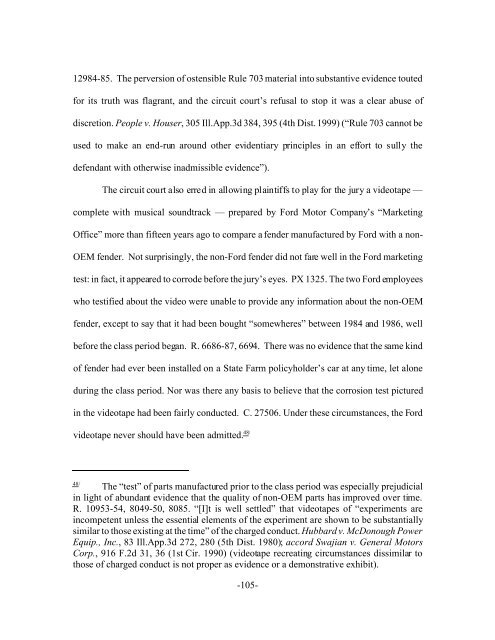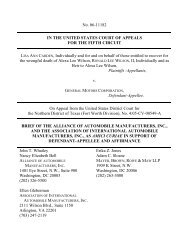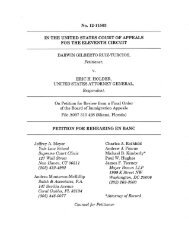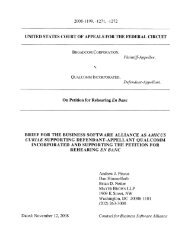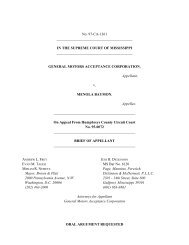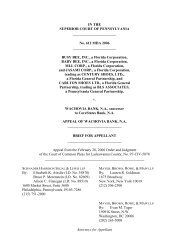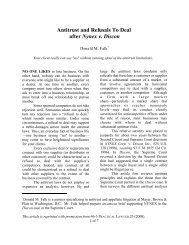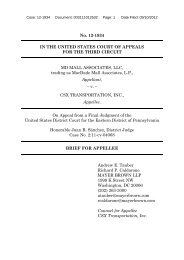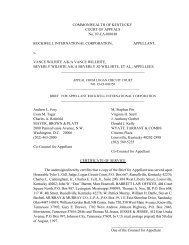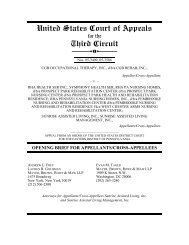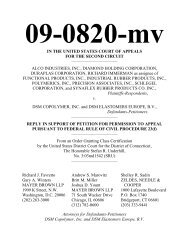No. 5-99-0830 IN THE APPELLATE COURT OF ... - Appellate.net
No. 5-99-0830 IN THE APPELLATE COURT OF ... - Appellate.net
No. 5-99-0830 IN THE APPELLATE COURT OF ... - Appellate.net
Create successful ePaper yourself
Turn your PDF publications into a flip-book with our unique Google optimized e-Paper software.
12984-85. The perversion of ostensible Rule 703 material into substantive evidence touted<br />
for its truth was flagrant, and the circuit court’s refusal to stop it was a clear abuse of<br />
discretion. People v. Houser, 305 Ill.App.3d 384, 395 (4th Dist. 1<strong>99</strong>9) (“Rule 703 cannot be<br />
used to make an end-run around other evidentiary principles in an effort to sully the<br />
defendant with otherwise inadmissible evidence”).<br />
The circuit court also erred in allowing plaintiffs to play for the jury a videotape —<br />
complete with musical soundtrack — prepared by Ford Motor Company’s “Marketing<br />
Office” more than fifteen years ago to compare a fender manufactured by Ford with a non-<br />
OEM fender. <strong>No</strong>t surprisingly, the non-Ford fender did not fare well in the Ford marketing<br />
test: in fact, it appeared to corrode before the jury’s eyes. PX 1325. The two Ford employees<br />
who testified about the video were unable to provide any information about the non-OEM<br />
fender, except to say that it had been bought “somewheres” between 1984 and 1986, well<br />
before the class period began. R. 6686-87, 6694. There was no evidence that the same kind<br />
of fender had ever been installed on a State Farm policyholder’s car at any time, let alone<br />
during the class period. <strong>No</strong>r was there any basis to believe that the corrosion test pictured<br />
in the videotape had been fairly conducted. C. 27506. Under these circumstances, the Ford<br />
videotape never should have been admitted. 48/<br />
48/<br />
The “test” of parts manufactured prior to the class period was especially prejudicial<br />
in light of abundant evidence that the quality of non-OEM parts has improved over time.<br />
R. 10953-54, 8049-50, 8085. “[I]t is well settled” that videotapes of “experiments are<br />
incompetent unless the essential elements of the experiment are shown to be substantially<br />
similar to those existing at the time” of the charged conduct. Hubbard v. McDonough Power<br />
Equip., Inc., 83 Ill.App.3d 272, 280 (5th Dist. 1980); accord Swajian v. General Motors<br />
Corp., 916 F.2d 31, 36 (1st Cir. 1<strong>99</strong>0) (videotape recreating circumstances dissimilar to<br />
those of charged conduct is not proper as evidence or a demonstrative exhibit).<br />
-105-


